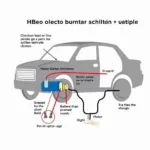Finding out how long diagnostics take on a car is a common question for vehicle owners. It can range from a quick 30 minutes to a couple of hours, depending on the complexity of the issue. Several factors influence the diagnostic process, from the expertise of the technician to the sophistication of the diagnostic equipment.
Factors Affecting Car Diagnostic Time
Several factors can influence the time it takes to diagnose a car problem. Understanding these factors can help manage expectations and prepare for potential repair costs. Let’s explore some of the key elements that play a role in diagnostic duration.
The Mechanic’s Expertise
A highly experienced mechanic, familiar with a wide range of vehicle makes and models, may be able to diagnose a problem more quickly than someone less experienced. Their expertise allows them to efficiently pinpoint the root cause of the issue. A seasoned mechanic’s intuition and knowledge can sometimes shorten the diagnostic process considerably. For instance, a strange noise might immediately suggest a specific problem to an experienced ear, while a novice might need more time to investigate.
Complexity of the Problem
A simple issue, like a loose gas cap triggering the check engine light, can be diagnosed relatively quickly. car diagnostic However, intermittent problems or complex electrical faults can require extensive testing and analysis, significantly increasing the diagnostic time. Imagine a car that only stalls under specific conditions; replicating and diagnosing that issue can be time-consuming.
Diagnostic Equipment Used
The type of diagnostic equipment used also impacts the time required. Modern vehicles rely heavily on computer systems, and sophisticated scan tools are necessary to access and interpret the data. While a basic code reader might give a general idea of the problem, a more advanced scan tool can provide detailed information, leading to a faster and more accurate diagnosis.
Accessibility of the Problem Area
If the problem area is easily accessible, diagnosis is generally quicker. However, if the issue lies within a complex system or a hard-to-reach component, it will take longer to diagnose. For instance, diagnosing a problem with the transmission might take significantly longer than diagnosing a faulty headlight. Accessing the transmission might involve removing other components, adding to the time.
How to Minimize Diagnostic Time
While some factors are beyond your control, there are steps you can take to potentially minimize diagnostic time. Providing clear and detailed information about the problem to your mechanic can greatly assist them. Mentioning any unusual noises, smells, or behaviors of the car can provide valuable clues. Also, keeping a record of when the problem occurs and under what conditions can help narrow down the possibilities.
car inspection and diagnostic check cost
What is the average car diagnostic time?
The average car diagnostic time can vary significantly. Simple issues can be resolved within 30 minutes, while complex issues can require hours.
How long does an electrical diagnostic take on a car?
Electrical diagnostics can be particularly challenging and can take anywhere from an hour to several hours depending on the complexity of the electrical system and the nature of the fault.
How can I speed up the car diagnostic process?
Providing clear and detailed information about the problem to your mechanic can help speed up the process.
Common Scenarios and Diagnostic Time Estimates
- Check Engine Light for Loose Gas Cap: 15-30 minutes
- Intermittent Starting Problem: 1-3 hours
- Brake Noise: 30-60 minutes
- Complex Electrical Fault: 2-4 hours (or more)
- AC not blowing cold air: 1-2 hours
“A comprehensive diagnostic approach, even for seemingly simple issues, is crucial for ensuring long-term vehicle health,” says automotive expert, Dr. Emily Carter, Ph.D., Mechanical Engineering.
“Accurate diagnostics saves time and money in the long run by preventing unnecessary repairs,” adds renowned automotive consultant, Mr. David Miller, ASE Certified Master Technician.
Conclusion
Understanding how long diagnostics take on a car empowers you to make informed decisions about your vehicle’s repair. While the time can vary based on several factors, being proactive and communicative with your mechanic can streamline the process. Remember, a thorough diagnosis is an investment in your vehicle’s longevity and your peace of mind. How long does diagnostics take on a car? It depends, but being informed helps!
FAQ
- Q: Is there a standard diagnostic time? A: No, the time varies depending on the complexity of the issue.
- Q: Should I be present during the diagnostics? A: It’s not usually necessary, but it can be helpful to discuss the problem directly with the mechanic.
- Q: What if the diagnostic doesn’t find the problem? A: Further investigation might be needed, sometimes involving specialized tools or consultations.
- Q: How much does a car diagnostic cost? A: Costs vary by location and the shop’s rates, so it’s always best to ask beforehand.
- Q: Can I do car diagnostics myself? A: Basic code readers can provide some information, but professional diagnostics are often required for accurate results.
- Q: What should I do after getting a car diagnostic? A: Discuss the repair options and costs with your mechanic to make an informed decision.
- Q: Are online diagnostic tools reliable? A: Online tools can offer some guidance but are no substitute for a professional diagnosis.
For further information on related car repair topics, you can explore articles on our website about car inspection costs, free AC diagnostics, and understanding car diagnostic codes.
Need help with your car diagnostics? Contact us via WhatsApp: +1(641)206-8880, or Email: [email protected]. Our customer service team is available 24/7.

